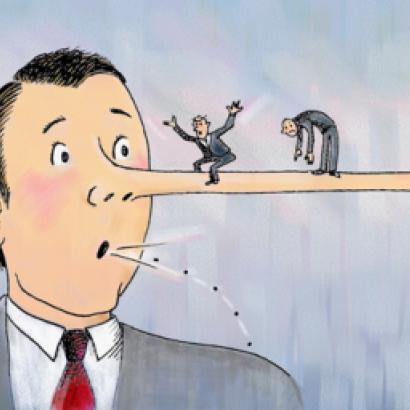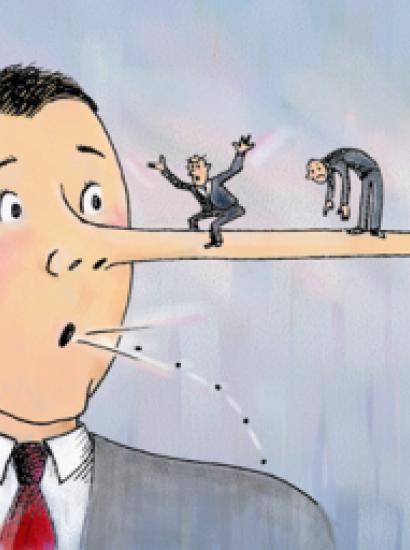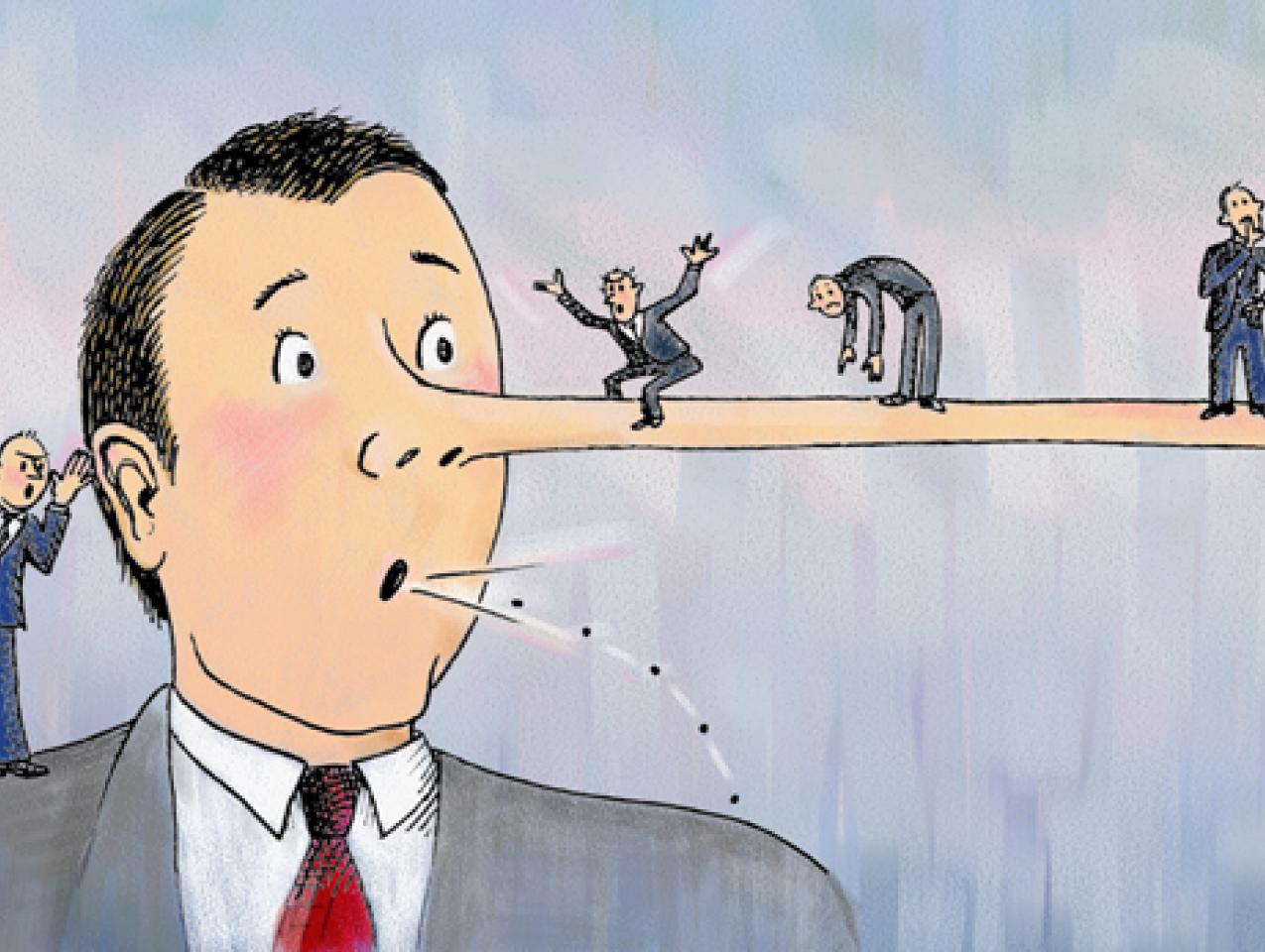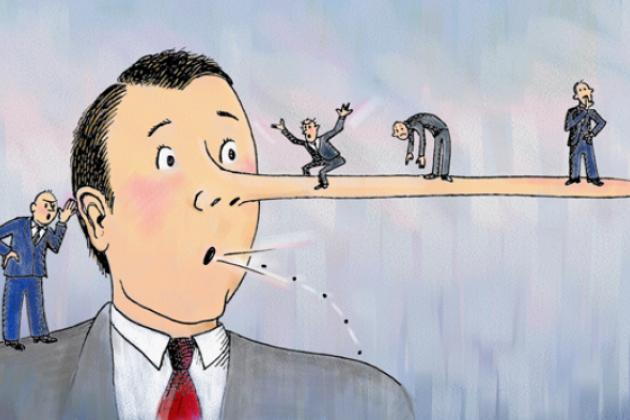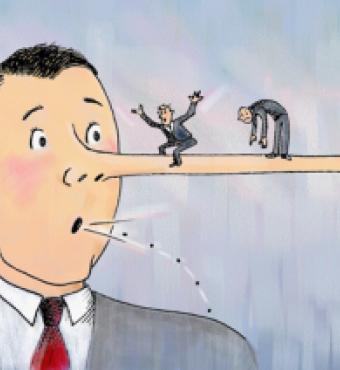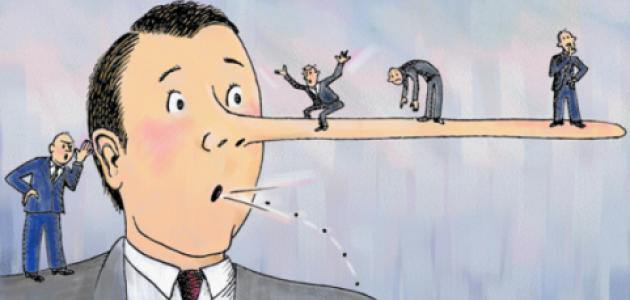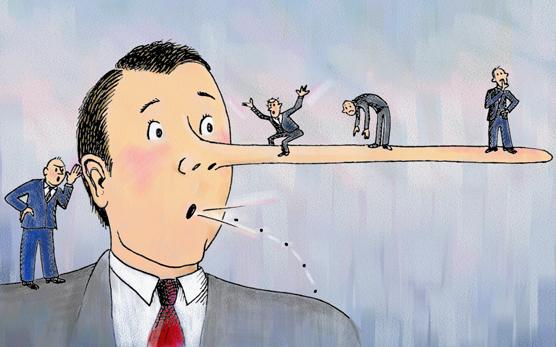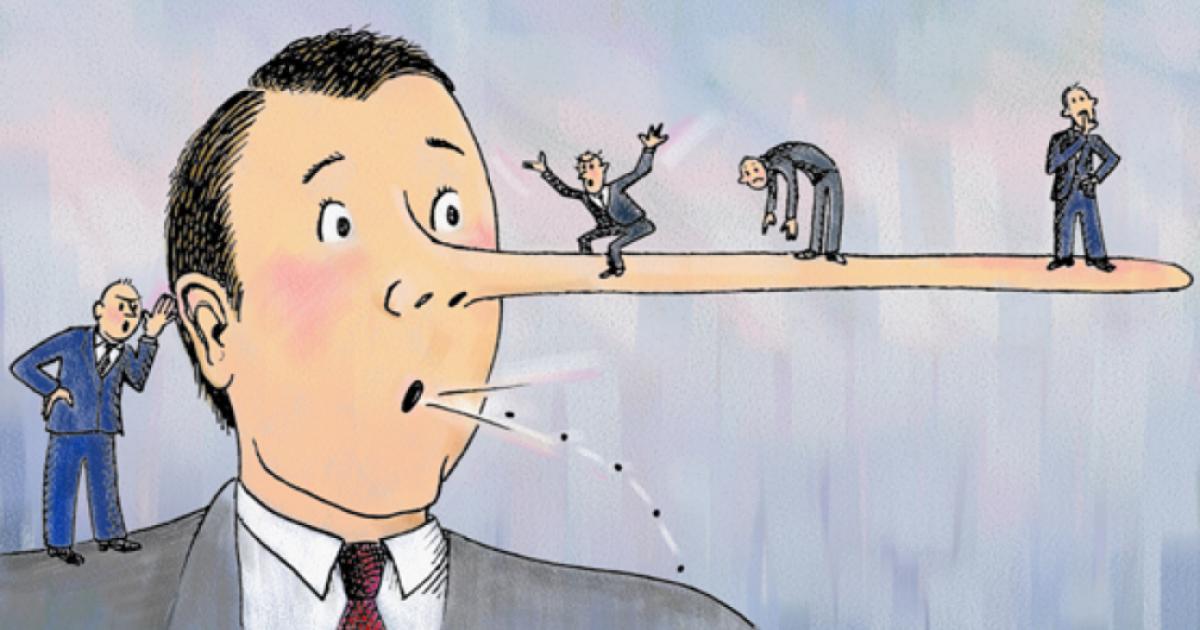- Law & Policy
- Civil Rights & Race
Editor's note: The essay below is from the online volume Endangered Virtues, a publication of the Hoover Institution’s Task Force on the Virtues of a Free Society.
For a number of reasons, people do not always stick to the truth when they speak. Some of the reasons are justifiable—for example, humane considerations such as tact and the avoidance of greater harm. Reassuring an ungainly teenager that he or she looks great may be a kind embroidery of the truth. In a more consequential instance, misinforming storm troopers about the whereabouts of a hidden family during the Nazi occupation of Europe was an honorable and courageous deception.
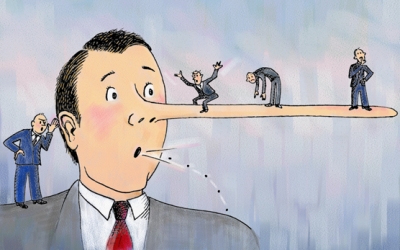
Illustration by Barbara Kelley
Honesty is not a wholly detached moral virtue demanding strict allegiance at all times. Compassion, diplomacy, and life-threatening circumstances sometimes require a departure from the entire unadulterated truth. Some vocations seem to demand occasional deception for success or survival. Politicians, for example, are especially hard-pressed to tell the truth consistently. Perhaps this is because, as George Orwell once observed, the very function of political speech is to hide, soften, or misrepresent difficult truths. Orwell was clearly skeptical about any expectation to the contrary. In “Politics and the English Language,” he put it this way: “Political language—and with variations this is true of all political parties, from Conservatives to Anarchists—is designed to make lies sound truthful and murder respectable, and to give an appearance of solidity to pure wind.”
Although in this case Orwell himself may have been guilty of overstatement for purposes of rhetorical effect, his claim cannot be totally dismissed. It would be naïve (or cynical) for anyone in today’s world to act shocked whenever a politician tries to hide the real truth from the public. For ordinary citizens, keeping up with the daily news means a constant process of speculating about what the politicians really meant by what they said and what they actually believe. It certainly does not mean taking what any of them say at face value.
Yet to recognize that honesty is not an absolute standard demanded for every life circumstance—and that we can expect a certain amount of deceit from even our respected public figures—is not to say that the virtue of honesty can be disregarded with impunity. A basic intent to be truthful, along with an assumption that people can be generally taken at their word, is required for all sustained civilized dealings.
Teaching honesty is no longer a priority in our schools.
No civilization can tolerate a fixed expectation of dishonest communications without falling apart from a breakdown in mutual trust. All human relations rely upon confidence that those in the relations will, as a rule, tell the truth. Honesty builds and solidifies a relationship with trust; and too many breaches in honesty can corrode relations beyond repair. Friendships, family, work, and civic relations all suffer whenever dishonesty comes to light. The main reason that no one wants to be known as a liar is that people shun liars because they can’t be trusted.
Honesty’s vital role in human society has been observed and celebrated for all of recorded history. The Romans considered the goddess Veritas to be the “mother of virtue”; Confucius considered honesty to be the essential source of love, communication, and fairness between people; and of course, the Bible’s Old Testament prohibited bearing false witness. It is also noteworthy that the two most universally heralded U. S. presidents (George Washington, who “could not tell a lie,” and Abraham Lincoln, who was known as “Honest Abe”) were widely acclaimed for their trustworthiness.
In a similar vein, religious leader Gordon Hinckley has written that, “where there is honesty, other virtues will follow”—indicating, as did the Romans, the pivotal role of truthfulness in all moral behavior and development. Hinckley’s comment was made in the context of his alarm-sounding book on “neglected virtues,” and it points to the problematic status of honesty in our society today. Although truthfulness is essential for good human relationships and personal integrity, it is often abandoned in pursuit of other life priorities.
Indeed, there may be a perception in many key areas of contemporary life—law, business, politics, among others—that expecting honesty on a regular basis is a naïve and foolish attitude, a “loser’s” way of operating. Such a perception is practically a mandate for personal dishonesty and a concession to interpersonal distrust. When we no longer assume that those who communicate with us are at least trying to tell the truth, we give up on them as trustworthy persons and deal with them only in a strictly instrumental manner. The bounds of mutual moral obligation dissolve, and the laws of the jungle reemerge.
Our serious problem today is not simply that many people routinely tell lies. As I have noted, people have departed from the truth for one reason or another all throughout human history. The problem now is that we seem to be reaching a dysfunctional tipping point in which an essential commitment to truthfulness no longer seems to be assumed in our society. If this is indeed the case, the danger is that the bonds of trust important in any society, and essential for a free and democratic one, will dissolve so that the kinds of discourse required to self-govern will become impossible.
A basic intent to be truthful is required for all sustained civilized dealings.
What are the signs of this in contemporary society? In professional and business circles, a now-familiar complaint is, “It used to be your word was good, but those days are gone.” In print, broadcast, and online news coverage, journalism has lost credibility with much of the public for its perceived biases in representing the facts. In civic affairs, political discourse is no longer considered to be a source of genuine information. Rather, it is assumed that leaders make statements merely to posture for effect, and not to engage in discussion or debate. In such an environment, facts may be manipulated or made up in service of a predetermined interest, not presented accurately and then examined in good faith. This is troubling, because civic leaders set the tone for communications throughout the public sphere.
Most troubling of all is that honesty is no longer a priority in many of the settings where young people are educated. The future of every society depends upon the character development of its young. It is in the early years of life—the first two decades especially—when basic virtues that shape character are acquired. Although people can learn, grow, and reform themselves at any age, this kind of learning becomes increasingly difficult as habits solidify over time. Honesty is a prime example of a virtue that becomes habitual over the years if practiced consistently—and the same can be said about dishonesty.
Honesty is the character virtue most closely linked to every school’s academic mission. In matters of “academic integrity,” which generally revolve around cheating, schools have a primary responsibility to convey to students the importance of honesty as a practical and ethical virtue. Unfortunately, many of our schools today are failing this responsibility.
Of all the breeches that can tear deeply into the moral fabric of a school, cheating is among the most damaging, because it throws in doubt the school’s allegiance to truth and fairness. Cheating in school is unethical for at least four reasons: 1) it gives students who cheat an unfair advantage over those who do not cheat; 2) it is an act of dishonesty in a setting dedicated to a quest for truthful knowledge, 3) it is a violation of trust between student and teacher; and 4) it disrespects the code of conduct and the social order of the school. As such, one would expect that cheating would provide educators with an ideal platform for imparting the key moral standards of honesty, integrity, trust, and fairness.
Incredibly, some teachers have actually encouraged students to cheat.
For educators looking for opportunities to help students learn from their mistakes, there is plenty of material to work with: research has shown that almost three-quarters of American college students (that is, students who have made it through high school) admit to having cheated at least once in their pre-college academic work. Donald McCabe, the most prominent contemporary researcher on school cheating, has concluded that “Cheating is prevalent, and…some forms of cheating have increased dramatically in the last 30 years.”
Yet many teachers, in order to avoid legal action and other contention, look the other way if their students copy test answers or hand in plagiarized papers. Some teachers excuse students because they believe that “sharing” schoolwork is motivated by loyalty to friends. Some teachers sympathize with student cheaters because they consider the tests that students take to be flawed, unfair, or too difficult. Such sympathy can be taken to extremes, as in the case of one teacher, observed by an educational writer, who held that “it was the teacher who was immoral for having given the students such a burdensome assignment...” when a group of students was caught cheating.
Incredibly, some teachers actually have encouraged students to cheat; and some have even cheated themselves when reporting student test scores. In July 2011, a widely-reported cheating scandal erupted in school systems in and around Atlanta, Georgia. State investigators found a pattern of “organized and systemic misconduct” dating back for over ten years. One-hundred-and-seventy-eight teachers, and the principals of half of the system’s schools, aided and abetted students who were cheating on their tests. Top administrators ignored news reports of this cheating: a New York Times story described “a culture of fear and intimidation that prevented many teachers from speaking out.”
Nor was this an isolated incident. In a feature on school testing, CBS News reported the following: “New York education officials found 21 proven cases of teacher cheating. Teachers have read off answers during a test, sent students back to correct wrong answers, photocopied secure tests for use in class, inflated scores, and peeked at questions then drilled those topics in class before the test.”
With such prominent and recent instances of cheating among students and teachers today, one would expect a concerted effort to articulate and promote the value of honesty in our schools. Yet school programs regarding academic integrity consist of little more than a patchwork of vaguely-stated prohibitions and half-hearted responses. Our schools vacillate between routine neglect and a circle-the wagons reaction if the problem boils over into a public media scandal. There is little consistency, coherence, or transparency in many school policies.
It is practically impossible to find a school that treats academic integrity as a moral issue by employing revealed incidents of cheating to communicate to its student body values such as honesty, respect for rules, and trust. In my own observations, I have noticed a palpable lack of interest among teachers and staff in discussing the moral significance of cheating with students. The problem here is the low priority of honesty in our agenda for schooling specifically and child-rearing in general.
In former days, there was not much hesitancy in our society about using a moral language to teach children essential virtues such as honesty. For us today, it can be a culture shock to leaf through old editions of the McGuffey Readers, used in most American schools until the mid-twentieth century, to see how readily educators once dispensed unambiguous moral lessons to students. Nowadays, when cheating is considered by some teachers to be an excusable response to a difficult assignment, or even a form of pro-social activity, our society risks a future of moral numbness brought on by a decline of honesty and all the virtues that rely on it. As the Founders of our republic warned, the failure to cultivate virtue in citizens can be a lethal threat to any democracy.
This superb article on the dishonesty of our culture just came to my attention. It is extremely heartening to learn that this issue is being placed on the public agenda.
In my view, "the end of honesty" is the result of a culture that has monetized all things, including human beings. When money became God, virtue became irrelevant. Personally, my hope lies in the spiritual awakening that is occurring around the globe and the realization emerging, at a higher level of consciousness, that we are intrinsically (at the level of the soul) one human species. As people discover that life is one inseparable whole, and that "what goes around" literally does come around, it seems inevitable that we can expect--over time--the rebirth of honesty and other forms of morality.
There is an extraordinary new film on the subject of honesty. It's called "A Separation" and I think it would be of the greatest interest to anyone interested in this subject. It's a profound portrayal of human beings wrestling with honesty in the depths of their consciences. It was made in Iran, which somehow makes it all the more riveting.
---Nancy Seifer








